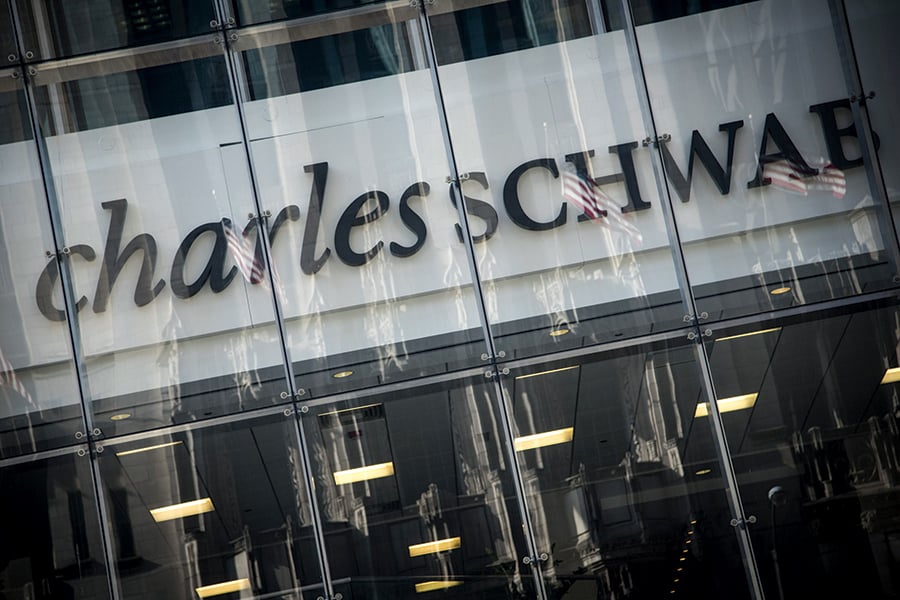

A handful of trading and wealth management websites went dark Monday as a result of unprecedented volumes of activity after stocks hit all-time highs on optimism about the potential for a COVID-19 vaccine.
Charles Schwab, ETrade, TD Ameritrade, Robinhood, Fidelity, Merrill Lynch and Vanguard all experienced some sort of technical difficulty — from login issues to slower processing speeds — while trading volumes surged, according to DownDetector, an outage monitoring website.
While the online brokerages have since resolved the issues, the free trading platform Robinhood was still experiencing complaints Tuesday morning, according to DownDetector.
A company spokesperson confirmed Robinhood systems are now operational. “Our engineering teams have worked diligently to harden our infrastructure, improve reliability and increase capacity,” a Robinhood spokesperson wrote in an email. “We’re continuing to invest more than ever in making sure that our systems scale and support our customers on busy trading days.”
Overall, these unprecedented periods of market volatility since March are exposing cracks in online brokerages, according to Sophie Schmitt, senior analyst at Aite Group.
“Online brokers sell the perception of real-time trading but the systems can’t deliver,” she said. “We see this especially with the funding process — the ACH transfers from an external bank account can take a day or two and when the funds arrive the trade idea may no longer be viable in a volatile market environment.”
Especially during milestone events like the Presidential election that can translate into increased trading volumes, firms will need take a second look at their systems to avoid these type of issues in the future, according to Director of Wealth Management at Javelin Strategy & Research William Trout.
On top of that, hindsight should enable online brokerages to better prepare for more market surges given today’s volatile economic, political and social environment, he said.
“Since the start of the pandemic, there has been a quantum leap in market participation among investors, both the self-directed kind and those using a digital or human adviser,” Trout said. “Brokerages have responded by expanding operational capacity consistent with the demands of a remote environment and the need for secured connectivity — more action may be needed.”
Schwab took to Twitter to address its technical issues, including clients having trouble logging-in. “Some Schwab applications experienced technical issues early yesterday which were resolved later in the morning,” a company spokesperson said in a statement. “We have since been working to address client questions as quickly as possible. We apologize for any inconvenience this may have caused our clients.”
TD Ameritrade, too, attributed its login issues across multiple TD Ameritrade platforms to Monday’s “unprecedented volumes of activity,” a company spokesperson wrote in an email.
“Yesterday, due to unprecedented volumes of activity, we encountered login issues across multiple TD Ameritrade platforms that impacted some clients’ ability to log in,” the spokesperson said. “The issue has been resolved and clients are able to access all TD Ameritrade platforms as usual. We apologize for the inconvenience and take the performance and reliability of our trading platforms very seriously.”
While Merrill Lynch did not have any outages Monday, the firm did experience “record trading volume, which resulted in slowness or login issues for some customers,” a spokesperson wrote in an email.
Similarly, Fidelity’s “slower processing speeds for a short period at market open” were due to “extremely high volumes, but trades were processed,” a spokesperson confirmed.
While it was unclear how many customers of the brokers were unable to get timely access and make trades, client frustration at being locked out of accounts was made public on social media.
Firms experiencing technical difficulties when markets spike or plunge has occurred in the past. More than two years ago, a group of wealth management firms went dark after a stock market plunge pushed Fidelity, TD Ameritrade, T. Rowe Price, Betterment and Wealthfront to be either temporarily inaccessible or perform slower than usual.
In March, a similar outage occurred at Robinhood.
E-Trade and Vanguard did not respond to requests for comment.

Relationships are key to our business but advisors are often slow to engage in specific activities designed to foster them.

Whichever path you go down, act now while you're still in control.

Pro-bitcoin professionals, however, say the cryptocurrency has ushered in change.

“LPL has evolved significantly over the last decade and still wants to scale up,” says one industry executive.

Survey findings from the Nationwide Retirement Institute offers pearls of planning wisdom from 60- to 65-year-olds, as well as insights into concerns.
Streamline your outreach with Aidentified's AI-driven solutions
This season’s market volatility: Positioning for rate relief, income growth and the AI rebound
